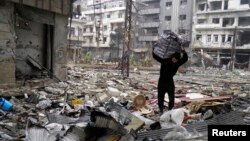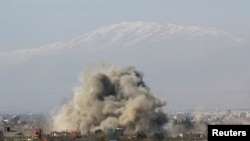U.N.-Arab League mediator Lakhdar Brahimi said the United Nations and the Assad government are still negotiating sending aid convoy to rebel-held city of Homs during comments to the press in Geneva, where peace talks are being held.
After Wednesday's sessions, Brahimi said he doesn't expect any substantive achievements by this Friday, when the first round of the talks is scheduled to end. But he expressed hope for a more productive second round about a week later.
"To be blunt, I do not expect that we will achieve anything substantive. I am very happy that we are still talking, but the ice is breaking slowly, but it is breaking,'' Brahimi said.
He added that gap between the two sides remained "quite large," and said he was hopeful that Russia and the United States would exert greater influence to help bridge that gap.
Brahimi said he hoped the warring factions will be able to narrow their differences in a second round of talks but he said whatever results that might be achieved will likely be minimal.
"But, those people in Syria and those people here for three years have not met once. they have sat together even once. And, so they do expect that there will be a magic wand that would enable us to resolve everything. There are a thousand miles to cross and if we take the first step, this will be very good," he said.
Earlier in the day, the Syrian government and the opposition delegation announced a deal to use a 2012 Geneva communique as a basis for negotiations.
Both sides, on Wednesday, announced their willingness to use the document, although there is disagreement over the next step in talks.
One provision in the communique calls for the creation of a transitional governing body. Negotiators say the opposition wants to start talks by focusing on this provision while the government wants to address it near the end of talks.
The government says it wants to focus on the issue of terrorism first. Still, opposition spokesman Louay Safi said it was a "positive step forward."
Rebels fighting Syrian President Bashar al-Assad insist he must leave power, while the Syrian government has said Mr. Assad's role is not up for debate at the peace conference.
Also Wednesday, Turkish security forces attacked a convoy of al-Qaida-linked rebel vehicles in Syria in retaliation for cross-border fire on Tuesday.
Troops opened fire on Islamic State of Iraq and the Levant positions in northern Syria after a mortar shell fired from Syria landed in Turkish territory during clashes between ISIL and the Free Syrian Army.
Al-Qaida and Oil
In another development, Western news organizations say the Syrian government is buying oil and gas from al-Qaida-linked groups that have seized control of some of those resources in Syria.
The news organizations say militants with the Islamic State of Iraq and the al-Nusra Front have used proceeds from oil and gas sales to finance their operations. The news organizations quote unnamed Western officials.
The New York Times on Wednesday said opposition activists in Syria's oil region claimed militant groups were also providing fuel to the government in exchange for relief from air strikes.
Lisa Schlein in Geneva contributed to this report
Images from Syria
After Wednesday's sessions, Brahimi said he doesn't expect any substantive achievements by this Friday, when the first round of the talks is scheduled to end. But he expressed hope for a more productive second round about a week later.
"To be blunt, I do not expect that we will achieve anything substantive. I am very happy that we are still talking, but the ice is breaking slowly, but it is breaking,'' Brahimi said.
He added that gap between the two sides remained "quite large," and said he was hopeful that Russia and the United States would exert greater influence to help bridge that gap.
Brahimi said he hoped the warring factions will be able to narrow their differences in a second round of talks but he said whatever results that might be achieved will likely be minimal.
"But, those people in Syria and those people here for three years have not met once. they have sat together even once. And, so they do expect that there will be a magic wand that would enable us to resolve everything. There are a thousand miles to cross and if we take the first step, this will be very good," he said.
Earlier in the day, the Syrian government and the opposition delegation announced a deal to use a 2012 Geneva communique as a basis for negotiations.
Both sides, on Wednesday, announced their willingness to use the document, although there is disagreement over the next step in talks.
One provision in the communique calls for the creation of a transitional governing body. Negotiators say the opposition wants to start talks by focusing on this provision while the government wants to address it near the end of talks.
The government says it wants to focus on the issue of terrorism first. Still, opposition spokesman Louay Safi said it was a "positive step forward."
Rebels fighting Syrian President Bashar al-Assad insist he must leave power, while the Syrian government has said Mr. Assad's role is not up for debate at the peace conference.
Also Wednesday, Turkish security forces attacked a convoy of al-Qaida-linked rebel vehicles in Syria in retaliation for cross-border fire on Tuesday.
Troops opened fire on Islamic State of Iraq and the Levant positions in northern Syria after a mortar shell fired from Syria landed in Turkish territory during clashes between ISIL and the Free Syrian Army.
Al-Qaida and Oil
In another development, Western news organizations say the Syrian government is buying oil and gas from al-Qaida-linked groups that have seized control of some of those resources in Syria.
The news organizations say militants with the Islamic State of Iraq and the al-Nusra Front have used proceeds from oil and gas sales to finance their operations. The news organizations quote unnamed Western officials.
The New York Times on Wednesday said opposition activists in Syria's oil region claimed militant groups were also providing fuel to the government in exchange for relief from air strikes.
Lisa Schlein in Geneva contributed to this report
Images from Syria






